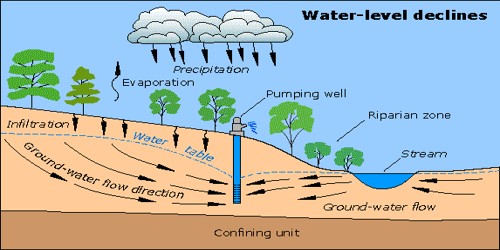Groundwater depletion is a serious threat to the environment. It is a valuable resource both in the United States and throughout the world. The majority of our bodies and the Earth is made up of water. Where surface water, such as lakes and rivers, are scarce or inaccessible, groundwater supplies many of the hydrologic needs of people everywhere.
We may see the beautiful, flowing surface waters that make up the oceans, lakes and rivers, but this water is not always safe for consumption and is much more difficult to filter than groundwater. Consequently, water from the ground is especially valuable.
Causes of Groundwater Depletion
Extensive lowering of the water table: This is due to the excessive pumping of water from the underground especially in case of wells. When the water is no longer available in the well, it is made still deeper to reach out to the water. But eventually, the water seems to be no longer available even in wells.
Groundwater depletion most commonly occurs because of the frequent pumping of water from the ground. We pump the water more quickly than it can renew itself, leading to a dangerous shortage in the groundwater supply. As a growing world with a population that continues to rise, the more we pump water from the ground at a rapid rate, the more difficult it is for the groundwater to provide us with the amount of water that we need.
(ii) Declination the surface water: When the ground water gets depleted, the surface water available in lakes and streams also gets considerably depleted. Hence, the water that is available for use becomes very less.
We continuously pump groundwater from aquifers and it does not have enough time to replenish itself. Water flows freely through the saturated rocks known as aquifers. There are large and small aquifers, and they are the underground water reserves that absorb water and hold it, enabling us to pump it for use.
The amount of water that aquifers hold is beyond impressive and can provide us with billions of gallons of water per day. While this amount of water seems plentiful, groundwater is a major contributor to the Earth’s freshwater supply and is responsible for providing up to 40% of freshwater in the world. Therefore, it doesn’t have the ability to recollect quickly enough to be continually sourced for our use.
(iii) Expenses incurred increase: When the ground water availability decreases, more losses are incurred in terms of finance as the water has to be pumped from a farther and deeper place. In certain cases, the digging of the well even seems to be infeasible too.
Agricultural needs require a large amount of groundwater. It’s frightening to think that there isn’t very much groundwater left when you consider how much water we use on a daily basis to support our population of billions and our personal lifestyles. A large amount of groundwater goes to farming, but the availability of groundwater is steadily declining.
Without it, it will be extremely difficult to provide drinking water and water for crops and animals that would help communities during times of drought. The less water that is available, the less food we have and we will be faced with the issue of great demand and very little supply.
Groundwater depletion can also occur naturally. The problems we would face with freshwater shortage is sure to cause problems in every aspect of our lives. The activities that lead to groundwater depletion come mostly from humans, but a portion of it also comes from changes in our climate and can speed up the process.
Information Source:
















